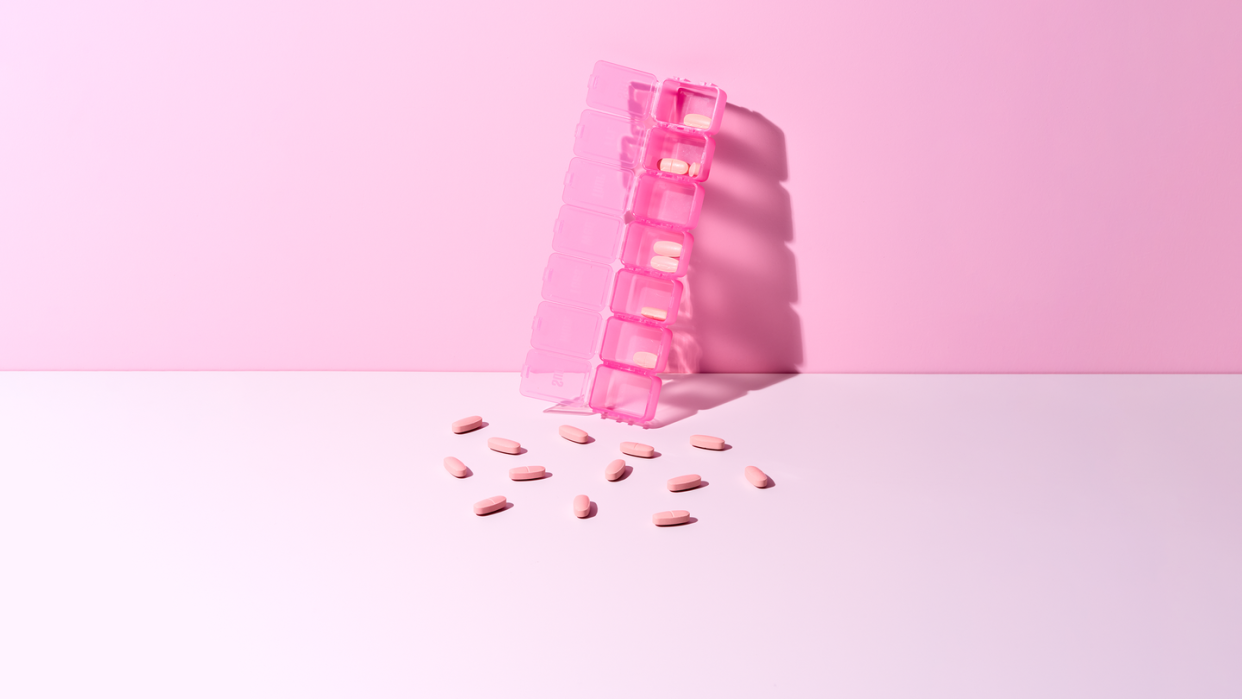Menopausal? You Probably Need These Supplements

"Hearst Magazines and Yahoo may earn commission or revenue on some items through these links."

Dealing with one of the 30-plus known symptoms of menopause? There’s a supplement for that. The mainstreaming of the menopause conversation has brought with it a wave of brands claiming to have a solution; our pain has been their gain. “You can’t blame a woman who has been dismissed in her doctor’s office and told it’s all in her head who sees an ad on social media for a solution and thinks, I have nothing to lose,” says ob-gyn Mary Claire Haver, MD, founder of the Galveston diet and author of The New Menopause.
While you might be tempted to take a menopause multivitamin (they exist!) and be done with it, experts are wary. "Multivitamins are never high enough in minerals like calcium and magnesium, and, ironically, that’s what people are most likely to lack,” says Daniela Turley, a New York–based medical herbalist, adding that the recommended doses are so large that it’s literally impossible to fit them in.
So how do you get what you need, and plenty of it? Here’s what the experts advise:
FIRST, TOP-LINE YOUR DIET
Good food, says Haver, needs to be at the core of menopause care. The bulk of vitamins and minerals your body needs should come from your diet; they are simply better absorbed that way. What you need less of: the sweet stuff. “The menopause transition is associated with issues with insulin resistance,” says Haver. The way our body processes glucose shifts, so paying close attention to added sugars is critical. “High-sugar foods can trigger hot flashes and night sweats and shift the microbiome to being one high in yeast, which can mess with hormone balance,” says Tasneem Bhatia, MD, a board-certified integrative medicine physician and author of The Hormone Shift.
CALCIUM
Turley says 90 percent of women she treats do not have adequate calcium, a deficiency that can contribute to osteopenia and osteoporosis. To hit the recommended daily amount of 1,000 to 1,200 milligrams, you need three solid helpings. Mary Jane Minkin, MD, an ob-gyn and clinical professor in the Department of Obstetrics, Gynecology, and Reproductive Sciences at the Yale School of Medicine, points to dairy, broccoli, and kale as good sources. Haver never recommends routine calcium supplementation, not only because it doesn’t get the job done as efficiently but because potential risks for cardiovascular disease have been found when it’s used in excess.
PROTEIN AND OMEGA-3 FATTY ACIDS
“One of the biggest issues postmenopause is a drop in muscle mass,” says Bhatia, which is why packing in protein matters. “Chasing the scale has led women to be really protein-deficient,” adds Haver. A diet rich in omega-3 fatty acids (abundant in fish like salmon, trout, and sardines) is also important during menopause because they’re powerful anti-inflammatory antioxidants that motor brain function and preserve heart, breast, and bone health.
FILL THE GAPS WITH THESE SUPPLEMENTS
“You can’t supplement your way out of poor nutrition,” says Haver, but it’s rare to get everything your body requires from diet alone, and that’s where supplements can help. Though they may be easily available, you should run anything you take by your doctor and get regular blood work. While individual needs will differ, there are several supplements that tend to do every body good during the menopause transition.
VITAMIN D
“If I had to pick one supplement for menopausal women to take, it would be vitamin D,” says Minkin. Adding that “while there are many foods that have vitamin D, it’s difficult to get the recommended amount that way.” The vitamin, which is crucial for maintaining bone health and keeping blood pressure in check, is also absorbed through sun exposure—but we’re getting less and less of that, too. “Of the menopausal women I see, 85 percent are deficient,” says Haver. Minkin’s standard recommendation is 1,000 to 2,000 milligrams daily.
MAGNESIUM
Magnesium is a major player during menopause, says Bhatia. Maintaining high levels is important for bone density and decreasing the inflammatory markers connected to heart disease—yet over 80 percent of women aren’t getting enough during menopause. “We know that hypomagnesemia [low serum magnesium] increases the risk of menopausal depression and other mood disorders,” says Haver.
Some foods to consider incorporating are black beans, edamame, chia and pumpkin seeds, almonds, cashews, and spinach. But most women are getting only 200 to 220 milligrams through their diets, while the FDA recommends 320 milligrams per day. Enter a supplement: Haver’s go-to recommendation for menopausal patients is magnesium L-threonate, which has been shown to have a greater bioavailability. She adds that when it’s taken in slightly higher doses than what’s recommended, magnesium is both safe and has a powerful medicinal effect to alleviate symptoms of depression and anxiety and to help disturbed sleep. She recommends 300 to 600 milligrams, so your combined dietary and supplemental daily intake is at least 500 milligrams. As with any supplements, but particularly when increasing dosage, you should always consult with your healthcare practitioner first.
PROBIOTICS
“What we’ve seen in perimenopause and menopause is a general slowing down of the gut and a decline in digestive enzymes,” says Bhatia. “When the microbiome shifts, you’re also going to experience more hot flashes and night sweats.” Stress, hormonal cascades, and antibiotics can throw healthy gut flora off balance, too. Because of that, Bhatia always suggests a probiotic (look for a 50 to 100 billion CFU cross-strained with a range of different bacteria).
VITAMIN B12
Bhatia also prioritizes a good vitamin B12 for her menopause patients; it’s helpful for bone health, cognition, and mood, particularly for vegans who often don’t get enough in their diets. Turley does caution, though, that overdoing it with B12 and folic acid has been found in studies to increase the risk of colorectal cancer. Always consult with your doctor to make sure you aren’t hyper-supplementing.
FIBER
The majority of American women get less than half the recommended 25 grams of fiber a day in their diet, says Haver. Foods that are rich in soluble fiber (like oatmeal, sweet potatoes, or lentils) can decrease someone’s chances of developing insulin resistance, since “the more fiber in your diet, the longer it takes to absorb sugars into the bloodstream,” says Haver. She has her patients track their fiber intake for a couple of weeks with Cronometer, an app designed to tally nutrients, not exclusively calorie count. “If you’re getting over 25 grams per day, you’re probably okay,” she says. If you’re not, Haver recommends a supplement that combines soluble and insoluble fiber. Just start slow, she advises, since the gut may protest at first and leave you feeling gassy and bloated.
NOW FINE-TUNE YOUR PLAN
Add an extra boost
Taking blood work and individual needs into account, you and your healthcare provider can see where additional supplementation might be beneficial. If her patients aren’t getting enough omega-3s from fish, Bhatia will supplement with 1,000 to 2,000 milligrams of fish oil. The same goes for protein (adding in protein powder). Bhatia has also found ashwagandha helpful for mitigating stress and CoQ10 for slowing cognitive decline. Turley often suggests the herbal supplement Vitex for her perimenopausal women who are experiencing dramatic shifts in their menstrual cycle. And Haver is a fan of turmeric, a powerful antioxidant and anti-inflammatory, for women dealing with musculoskeletal or arthritic pain.
Check your sources
“Not all supplements are created equal, and the problem in the United States is that we have very poor supervision,” says Minkin, pointing out that there is not adequate research around supplements and zero FDA regulation. Be especially mindful about your sources. Bhatia recommends looking for a USP (United States Pharmacopeia) or NSF (National Sanitation Foundation) seal; brands can submit themselves for evaluation to both organizations. Supplement brands sold directly by practitioners (Turley orders hers through Fullscript) are often the safest bet.
Don’t overdo it
Besides the very real risks that come with overdoing it with certain minerals like calcium and vitamin D, taking greater quantities doesn’t translate to better health. One common issue Bhatia sees in menopausal patients is too many blood thinners—“If you’re doing a lot of fish oil plus turmeric and a baby aspirin a day, that’s a lot of blood thinning,” she explains. Always work in tandem with your healthcare provider to make sure you aren’t going overboard. Remember, when it comes to supplements, more is not necessarily better.
Any content published by Oprah Daily is for informational purposes only and does not constitute medical advice, diagnosis, or treatment. It should not be regarded as a substitute for professional guidance from your healthcare provide.
You Might Also Like

